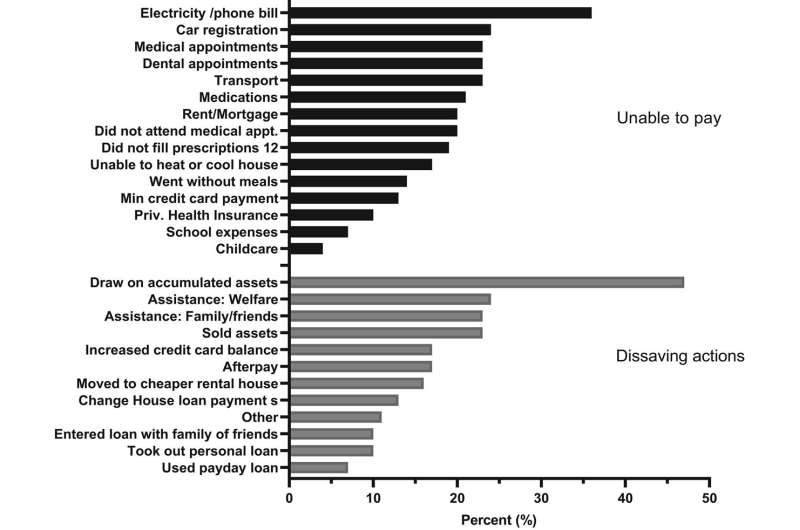This article has been reviewed according to Science X's editorial process and policies. Editors have highlighted the following attributes while ensuring the content's credibility:
fact-checked
trusted source
proofread
Financial toxicity rife for rural Australians with chronic kidney disease

Australians with chronic kidney disease who live in rural locations have reported catastrophic economic consequences, depletion of income and leave, and difficulty coping with unexpected expenses in accessing kidney replacement therapy.
Despite living in a high-income country with universal health care, rural households experience considerable financial hardship in accessing treatment for chronic kidney disease and other health-related care.
Researchers from Flinders University's Remote Health Practice investigated the effects of the financial burden—or toxicity—including out-of-pocket expenses experienced by people with chronic kidney disease who live in rural settings in Australia. Their findings are published in the journal Nephrology.
Study leader Dr. Nicki Scholes-Roberts from the College of Medicine and Public Health says chronic kidney disease and its treatment places a huge financial burden for those patients living in rural locations.
"We found that rural households' out-of-pocket expenses were an average of $5,056 AUD annually (excluding private health insurance costs) with 78% of households experiencing financial hardship, and 54% classified as experiencing financial catastrophe (out-of-pocket expenditure greater than 10% of household income).
"A large percentage of these costs were travel and transport related. Average distances to access health services for all rural and remote classifications was more than 50 kilometers for specialist nephrology services and more than 300 kilometers for transplanting centers.
"Around 24% of patients had to relocate for more than three months during treatment to access care with over half of rural households in this study having to use their savings or superannuation to afford relocation costs," said Dr. Scholes-Robertson.
The research concluded that a greater understanding of the impact of financial toxicity experienced by rural households with chronic kidney disease is required to understand how it effects a patient's care, their treatment choices, health outcomes and quality of life.
"A prospective study capturing real costs to the patients and their families including lost wages, and subjective impacts would show the true financial toxicity experienced by rural patients at crucial times in the chronic kidney disease journey.
"More needs to be done to address the financial burden, particularly the out-of-pocket expenses which are carried by those who can least afford it, if the objectives of universal health care provision in Australia are to be met.
"We need to consider innovative models of care such as dialysis services and mobile trucks that provide essential services to some of the remotest communities and whether these types of innovative service models can be adapted to rural, as well as remote settings," Dr. Schole-Robertson concludes.
More information: Nicole Scholes‐Robertson et al, Financial toxicity experienced by rural Australian families with chronic kidney disease, Nephrology (2023). DOI: 10.1111/nep.14192














